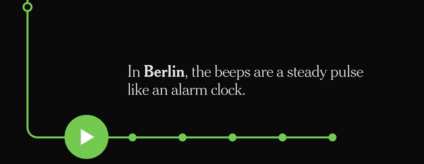As we carefully re-enter our streets and cities, listen to the hidden melodies of subways around the world
Thanks to Azeem Azhar’s Exponential View for pointing us to this beautiful interactive article from The New York Times, profiling a man who has (a little obsessively) recorded the automatic messages heralding the closing of doors on the world’s undergrounds, tubes, metros and subways.
As we tip-toe back into our urban world, it’s a lovely idea to dwell on these sonic transitions - how you might craft them to hit the balance between ensuring our safety, and not driving us crazy. An excerpt:
When it comes to designing a new transit chime, there is much to consider. Length, for one, especially given what is called “dwell time,” when a train is lingering in the station.
“One of the biggest things about transit is just trying to get people to step lively on and off trains as the doors are about to close,” said Max Diamond, a New York City Transit conductor. “It seems to a layperson like a door chime is innocuous, but it’s a really critical part of keeping the capacity of the subway up.”
So, Diamond said, you wouldn’t want the chime to be too long, or it might slow things down further on an already overburdened transit system. On the other hand, according to Fisher, of the British Columbia Rapid Transit Company, it can’t be too short or people might miss their window of opportunity to rush out the doors. (New York’s two-note chime lasts just a fraction of a second, on the shorter side of transit chimes.)
Then there’s the question of how best to get people’s attention. A relaxing melody might fail to rouse slow-walking commuters from their daydreams, as they shuffle out the door. “You cannot use too gentle a sound, because to get hit by the door is not pleasant,” Phanekham said. “A nice musical sound with a harmony might be a false promise.”
But there is rider experience to think about, as people hear the chimes day in and day out, often during stressful parts of their day. Fisher said descending chimes might be more soothing than the upbeat sound of climbing notes. “If you just miss your train, hearing the ascending chimes is really aggravating,” he said.
More here (make sure you scroll down and click on all the prompts).


